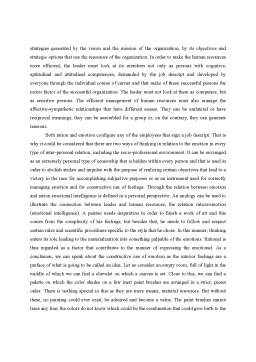Extras din referat
Contemporary society can be considered a society of the organizations. It can be said that we are living in an organizational society due to the fact that social organization, in the last half of century generated a social structure of the type of the organization. Peter Druker and Etzioni Atmitai emphasize the evolution of human groups towards the structure of the organizational type in such a manner that our lives are fundamentally influenced by industrial organizations, by primary and secondary socialization or by organizations of preserving culture, of personal and financial protection. All the fields of our social activities are characterized through the process of rationalization as a process of adjusting the means to the purposes, in the middle of which the leader plays an important role as centre of the organization’s dynamicity.
More and more stress is put on the importance that a leader has in defining the vision and the mission of the organization and in the gearing of human resources as resources of all other resources (material, financial, temporal). The success of an organization is assured by the managerial type, the type of organizational culture and, especially if the manager is a leader and a ruler. Among the qualities of a leader is also that of social and emotional intelligence. Social and emotional competences such as knowing yourself, self-control, motivation, empathy ensure to the leader the capacity of leading the group towards accomplishing its objectives. The leader has a central role in the organizational dynamics, in defining the vision, in establishing the mission and the strategic focuses and in accomplishing all goals. And emotional intelligence is one of the means. My aim is to account for the fact that emotional intelligence is an essential feature of a leader and that its employment in the organization leads towards an efficient leadership.
In the inter-human relationships within the groups and the organizations the equilibrium offered by the mixes between the social and the psychological, the objective and the subjective. The rapports between the members of the organization are social, objective because they take place in and they depend on the social contexts in which the individuals live and psychological because the individuals participate in their statuses and roles with their own profile of personality. Human groups of the type of the organization have a controlled dynamic through the strategies generated by the vision and the mission of the organization, by its objectives and strategic options that use the resources of the organization. In order to make the human resources more efficient, the leader must look at its members not only as persons with cognitive, aptitudinal and attitudinal competences, demanded by the job descript and developed by everyone through the individual course of carrier and that make of these successful persons the motor factor of the successful organization. The leader must not look at them as computers, but as sensitive persons. The efficient management of human resources must also manage the affective-sympathetic relationships that have different senses. They can be unilateral or have reciprocal meanings, they can be assembled for a group or, on the contrary, they can generate tensions.
Preview document
Conținut arhivă zip
- Leadership and Organizational Communication.docx
























